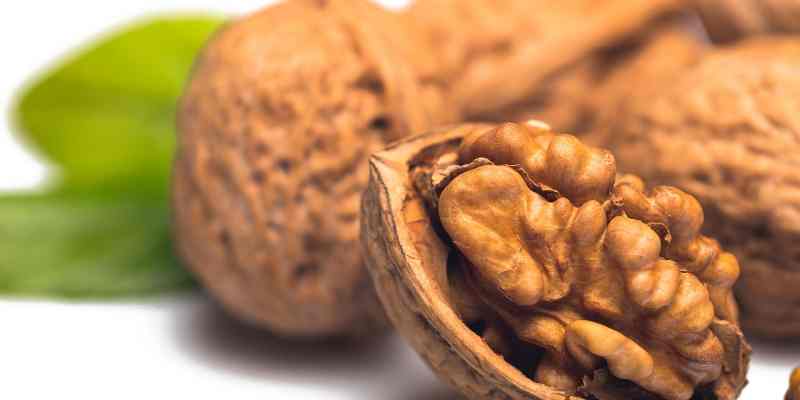Walnuts are the type of nuts that comes from any tree in the Juglans species. Juglans regia, the prevalent or English walnut, originally comes from Asia but is now cultivated all over the globe.
The black walnut, Juglans nigra, is indigenous to the United States. It has a thicker shell and a better flavor than the English walnut.
This sort of nut includes plenty of natural antioxidants and other nutrients. Both humans and dogs can take benefit of these antioxidants, right? Well, let’s first attempt to find out all the facts, before jumping into any conclusions.
Do you have a specific question about dogs and walnuts? Then use the table of contents below to jump to the most relevant section. And you can always go back by clicking on the black arrow in the right bottom corner of the page. Also, please note that some of the links in this article may be affiliate links. For more details, check the Disclosure section at the bottom of the page.
Here's what we'll cover:
Can dogs have walnuts?
According to the USDA (United States Department of Agriculture) Food Database, the serving of 100 g of walnuts contains 643 calories, 14.29g of protein, 64.29g of fats (5.36g is saturated), 14.29g of carbs, including 7.1g of fiber and a bit of minerals and nutrients including 2.86mg of Iron and 429mg of Potassium.
Walnut is increasing in popularity due to its positive impacts on the brain, blood lipid profile, cardiovascular illness, diabetes, and so. Moreover, walnuts are associated with improvements in human inferential verbal reasoning and decreasing the potential risk of cancer.
The walnut-enriched diet also was found responsible for lowering LDL-Cholesterol levels and improving the systolic blood pressure.
Walnuts (Juglans regia) has been correlated with foodborne disease outbreaks in latest years. Fruits and nuts account for 7% of the total number of all foodborne outbreaks.
You might also like:
Can dogs eat shrimp? (I bet there’s something you didn’t know)
Full guide on hypoallergenic dog food
So some troubling facts were revealed in one study conducted by research teams from the College of Mechanical and Electronic Engineering, Northwest A&F University, Yangling, Shaanxi, and Department of Biological Systems Engineering, Washington State University.
This research aimed to explore the distribution of bacteria on in-shell walnut surfaces from six representative provinces in China.
Due to the distinctive harvesting techniques, many microorganisms in the setting inevitably infect the walnut surface and are most probable to be re-infected during the phase of storage, transportation, and sales.
These microorganisms may include some foodborne pathogens such as Salmonella, Aspergillus, Shigella, Listeria monocytogenes, and Escherichia coli, which can cause foodborne disease and even death in animals.
Also, some bacteria and fungi may generate toxins that are hard to regulate during processing. Twenty-eight samples were gathered from fourteen areas in six provinces and harvested over distinct periods. And the researcher found that ALL samples were home to colonies of different microorganisms.
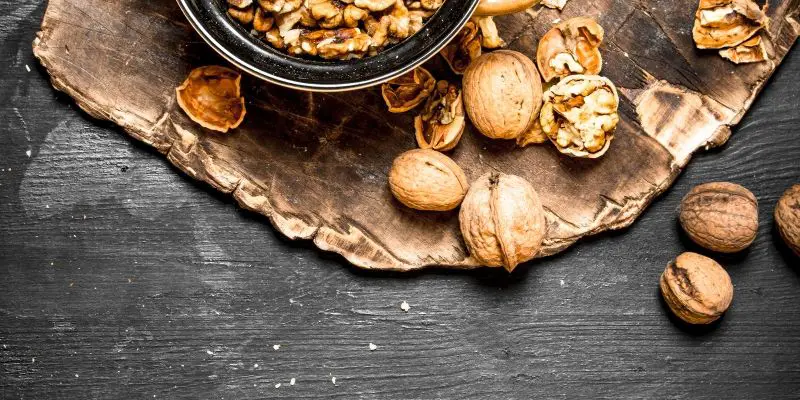
Based on approximations of USDA mycotoxins (poisonous compounds that are naturally created by certain kinds of fungi (molds)-including those that grow on walnuts) are estimated to impact 25% of the world’s plants and cost the US agriculture roughly $1 billion annually.
So, while walnuts themselves are not necessarily bad for dogs, they are often infected with fungi that render them poisonous to dogs (and humans as well).

Can dogs eat walnut shells?
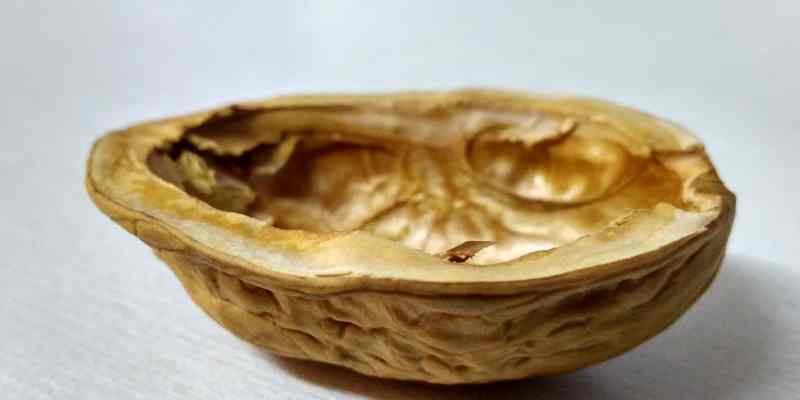
No, absolutely not. If your dog eats a walnut shell, it can cause some severe troubles. For instance, it can get stuck in the intestines of the dog and create a blockage.
If the shell has been consumed, you should call your vet straight away. Smaller dogs are especially at danger of impaction, but your veterinarian will likely want to examine your dog regardless of their size.
And don’t forget about those colonies of microorganisms we’ve discussed above. Those are most likely to be inhabiting within the cracks of walnut’s shells.

Black walnuts and dogs
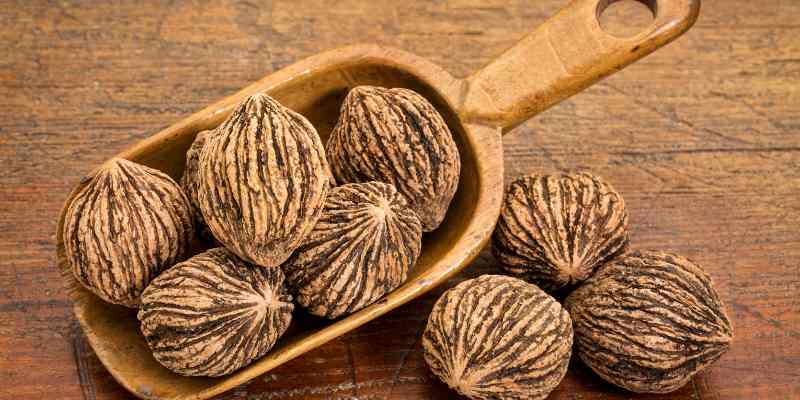
According to the USDA (United States Department of Agriculture) Food Database, the serving of 100 g of black walnuts has 619 calories, 24.06g of protein, 59.33g of fats (3.48g are saturated), 9.58g of carbs, including 6.8g of fiber. And it’s LOADED with nutrients.
The list includes 61mg of Calcium, 3.12mg of Iron, 201mg of Magnesium, 513mg of Phosphorus, 2mg of Zinc, 1.7mg of Vitamin C, 523mg of Potassium, 0.057mg of Thiamin, 0.13mg of Riboflavin, 0.47mg of Niacin, 0.58 mg of Vitamin B6, 2.08 mg of Vitamin E and more.
Sounds like a pretty nutritious treat for your pup.
However, according to the American Society for the Prevention of Cruelty to Animals ® (ASPCA ®), Black Walnuts are poisonous to dogs.
And if there’s is a black walnut tree somewhere in your area, keep in mind that dogs ingesting those walnuts off the ground may have tremors and seizures from moldy produce.

Can dogs eat English walnuts?
No, your pet shouldn’t eat English walnuts.
As stated by the USDA (United States Department of Agriculture) Food Database the serving of 100 g of English walnuts has 654 calories, 15.23g of protein, 65.21g of fats (6.12g are saturated), 13.71g of carbs, including 6.7g of fiber. As well as quite impressive amounts of other vitamins and nutrients.
Those include 98mg of Calcium, 2.91mg of Iron, 158mg of Magnesium, 346mg of Phosphorus, 3.09mg of Zinc, 1.3mg of Vitamin C, 441mg of Potassium, 0.34mg of Thiamin, 0.15mg of Riboflavin, 1.12mg of Niacin, 0.537 mg of Vitamin B6, 0.7 mg of Vitamin E and more.
But in spite of all that nutritional abundance, English walnuts can cause stomach pain or even obstruction in your dog’s body.
And like any other form of walnuts, English walnuts can be contaminated with molds that contain tremorgenic mycotoxins (poisonous chemicals generated by fungi) that can trigger seizures or other neurological symptoms.

Are walnuts bad for dogs?
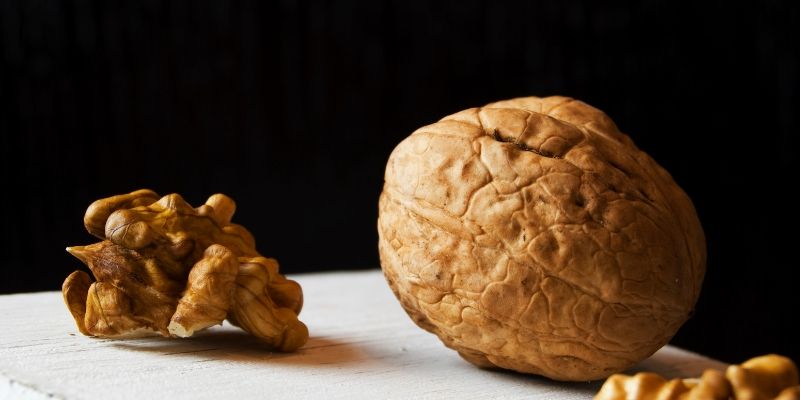
While all the nutrients and healthy fats in walnuts are not bad for animals, remember that some kinds of walnuts (black walnuts) are poisonous to canines. And the fungi that grow on all sorts of this product can also be hazardous.
Walnuts can be contaminated with fungi at any point, from harvest to shelf. And they may be infected, whether they are shelled or not.
It can be washed, and this may remove some of the inevitable fungal growth. Some suggest washing walnuts with vinegar. Others suggest boiling water, followed by drying thoroughly. But, there is no certainty that this will be efficient.
The mycotoxins that fungi create often cannot be seen, so there’s no way to tell if they’ve been washed off.
So I recommend you to keep those walnuts out of your pup.

My dog ate walnuts. What do I do?
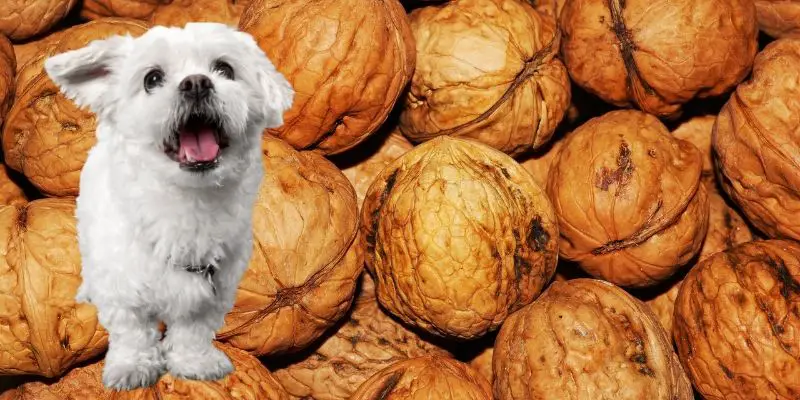
You don’t have to freak out if your pup tries to sneak a walnut. However, you should be worried if the pup ate a bunch of it.
Your dog won’t necessarily get sick, but to be sure you should keep an eye on him for a few hours. If you notice any weird symptoms or unusual behavior, call your vet immediately.
A dog poisoned with tremorgenic mycotoxins often vomits before other symptoms begin. This may help in reducing the amount of mycotoxins in pup’s body, so it’s a good thing.
A tiny quantity of mycotoxins could trigger light tremors, that will be difficult to see but can be felt if you are holding the dog.
Tremors grow stronger in severe poisoning, and the dog may become unstable on its feet. The shaking can get worse, and the dog might end up having seizures.
If the moldy walnuts sicken your dog, the vet will offer it to absorb the mycotoxins. And most likely they will also offer diazepam (Valium) to regulate seizures.
Any other therapy will be based on the symptoms of the dog.

Walnuts and dogs. Summary
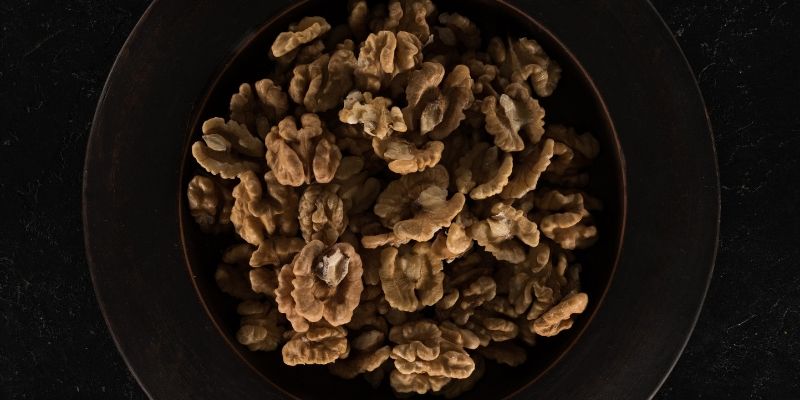
Some types of walnuts aren’t dangerous in small amounts. However, it’s not worth the risk to share those nuts with your pet as ALL types of moldy walnuts are very toxic.
If you believe your dog has eaten moldy walnuts, you should seek your vet’s instant assistance and medical attention to guarantee that your pup makes a quick recovery.
If you’re searching for ingredients that can boost the fat content of your dog’s diet, there are an abundance of choices you can pick from. Walnuts are not worth the risk they pose to our pups.
Thanks for the blog graphics: Canva.com

